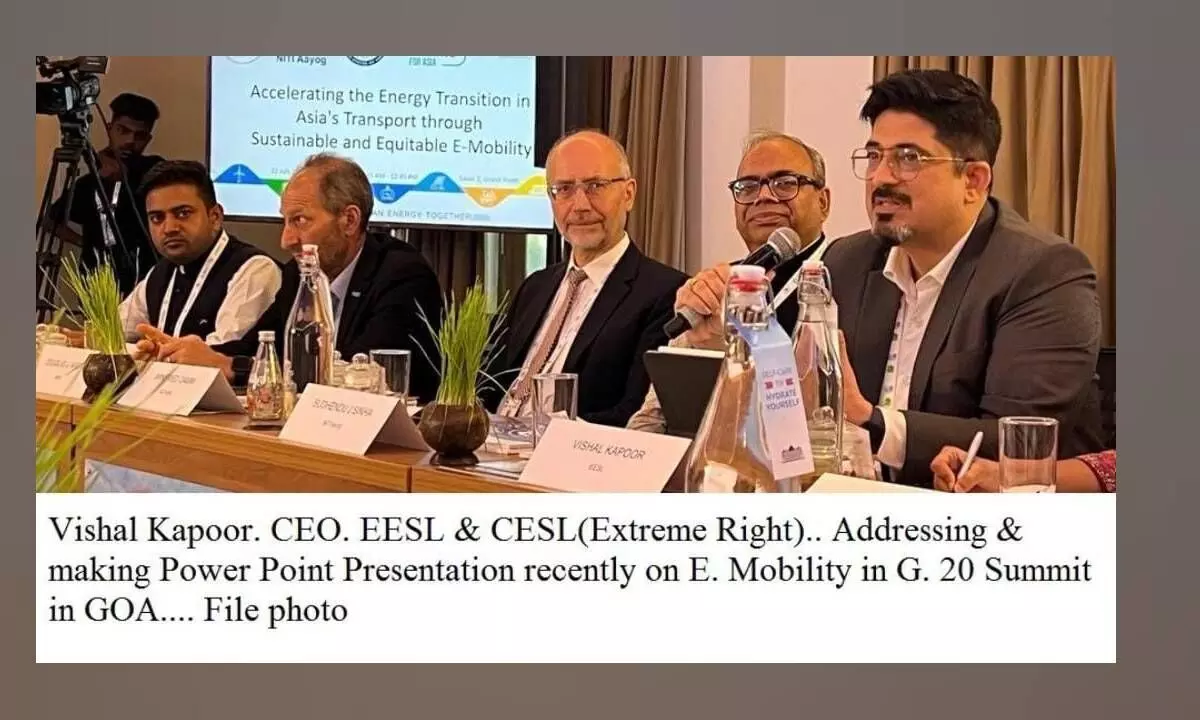CESL takes lead in greening roadways
Convergence Efficiency Services Limited (CESL), a subsidiary of Energy Efficiency Service Limited (EESL), a joint venture under the Ministry of Power, has emerged as the driving force behind India’s electric vehicle (EV) revolution propelling the National Electric Bus Program (NEBP).
image for illustrative purpose

Vijayawada Convergence Efficiency Services Limited (CESL), a subsidiary of Energy Efficiency Service Limited (EESL), a joint venture under the Ministry of Power, has emerged as the driving force behind India’s electric vehicle (EV) revolution propelling the National Electric Bus Program (NEBP).
NEBP stands as a testament to CESL’s resolute commitment, positioning India at the vanguard of EV innovation. Envisioned under the Faster Adoption and Manufacturing of Electric Vehicles (FAME) II Scheme, NEBP represents a significant stride towards sustainable public transit, igniting broad adoption of electric buses in key cities.
According to officials, the CESL, in an unconventional move, invited metropolis to the initiative, deviating from conventional practices. The enthusiastic response from major cities- Surat, Hyderabad, Bengaluru, Kolkata and Delhi have heralded an era of eco-conscious transit. This strategic aggregation of demand has led to an impressive requisition of 5,450 electric buses, poised to transform city mobility.
EESL CEO Vishal Kapoor, who motivated stakeholders at the recent G20 Summit in Goa, reviewed initiatives on e-mobility through a webinar with CGM of CESL Rajneesh Rana and Cluster Heads on Sunday.
According to EESL officials of Andhra Pradesh, the State’s proactive approach to electric mobility makes substantial contributions to the eco-conscious cause. Marked by inventive initiatives and robust infrastructure, AP has committed to take the lead in popularising electric vehicles.
Based on the feedback of CESL reports, Vishal Kapoor appreciated the sustained efforts of K Vijayanand, Special Chief Secretary, Energy, AP, Vice Chairman & MD, New and Renewable Energy Development Corporation of AP (NREDCAP); S Ramana reddy and VC & MD APSRTC; D Tirumala Rao, for deploying 296 Mahindra E-Verito and Tata Tigor electric cars, alongside 100 electric buses on key routes
He said that apart from major proactive States like Gujarat, Maharashtra, Madhya Pradesh, West Bengal, Karnataka and Telangana, AP demonstrates the feasibility and advantages of EV adoption.
The CESL’s groundbreaking Gross Cost Contracting (GCC) model streamlines procurement, unlocks economies of scale, and cuts operational costs. Rates revealed by CESL are remarkable viz. 31 per cent lower than diesel and 18 per cent lower than CNG vehicles, showcasing their commitment to innovative sustainable transportation strategies, he said.
The inaugural chapter of the NEBP unfolds as Delhi and Benguluru sign historic concession agreements with Tata Motors. Over 150 electric buses have already graced the streets of Delhi, marking a tangible transition towards greener mobility solutions.
The deployment not only enhances air quality but also underscores the feasibility and efficiency of CESL’s pioneering model.
CESL’s unwavering commitment propels them into the next phase of the NEBP Phase II. With a target to deploy 50,000 electric buses by 2030, CESL takes center stage as the program manager.

